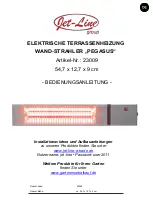
43
HOUSEKEEPING
Vacuum around base of water heater for dust, dirt, and
lint on a regular basis.
VENTING SYSTEM INSPECTION
At least once a year a visual inspection should be made
of the venting system. You should look for:
Obstructions which could cause improper venting.
The combustion and ventilation air fl ow must not be
obstructed.
Damage or deterioration which could cause improper
venting or leakage of combustion products.
Be sure the vent piping is properly connected to prevent
escape of dangerous fl ue gasses which could cause
deadly asphyxiation.
Obstructions and deteriorated vent systems may present
serious health risk or asphyxiation.
Chemical vapor corrosion of the fl ue and vent system
may occur if air for combustion contains certain chemical
vapors. Spray can propellants, cleaning solvents,
refrigerator and air conditioner refrigerants, swimming pool
chemicals, calcium and sodium chloride, waxes, bleach
and process chemicals are typical compounds which are
potentially corrosive.
If after inspection of the vent system you found sooting or
deterioration, something is wrong. Call the local gas utility
to correct the problem and clean or replace the fl ue and
venting before resuming operation of the water heater.
FLOOD DAMAGE
Flood damage to a water heater may not be readily visible
or immediately detectable. However, over a period of time
a fl ooded water heater will create dangerous conditions
which can cause DEATH, SERIOUS BODILY INJURY,
OR PROPERTY DAMAGE. Contact a qualifi ed installer or
service agency to replace a fl ooded water heater. Do not
attempt to repair the unit! It must be replaced!
1.
2.
INSTALLED IN SUITABLE AREA: To insure suffi cient
ventilation and combustion air supply, proper clearances
from the water heater must be maintained. See “Facts to
Consider About Location” section. Combustible materials
such as clothing, cleaning materials, or fl ammable liquids,
etc. must not be placed against or adjacent to the water
heater which can cause a fi re.
ANODE ROD INSPECTION
Each water heater contains at least one anode rod, which
will slowly deplete (due to electrolysis) prolonging the life
of the water heater by protecting the glass-lined tank from
corrosion. Adverse water quality, hotter water temperatures,
high hot water usage, hydronic heating devices, and water
softening methods can increase the rate of anode rod
depletion. Once the anode rod is depleted, the tank will
start to corrode, eventually developing a leak. Certain
water conditions will cause a reaction between the anode
rod and the water. The most common complaint associated
with the anode rod is a “rotten egg smell” produced from
the presence of hydrogen sulfi de gas dissolved in the
water.
Important:
Do not remove this rod permanently as it will
void any warranties. A special anode rod (Kit # 9006291005)
may be available if water odor or discoloration occurs (see
“Replacement Parts”).
MAINTENANCE
Содержание ELITE 153.331000
Страница 3: ...3 GENERAL SAFETY ...
Страница 56: ...56 R O N M L K J I H G F E D C B A T Q S P 12 15 14 U 10 7 6 5 4 3 2 1 Z Y X W V 11 9 8 13 ...
Страница 58: ...58 NOTES ...
Страница 59: ...59 NOTES ...
















































